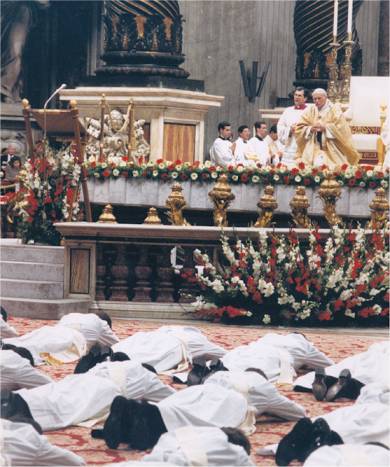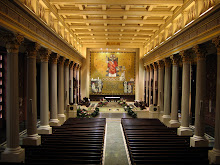A reader asks:
Does the fact that the chant tones will be provided indicate that we will be expected to use them, or will they just kind of be "there"?
Well, I am not an expert, but I think the general feeling is that they should be used regularly, and that they will provide a good basis for increased solemnity, but much of it will depend on the facility of the preist with chant. (My point: even the most tone deaf man can learn to carry one note, if not just two simple notes.)
Increased Solemnity would be that the 'higher' the feast, the more musical notation and chant should be included. Therefore, Easter Sunday Mass could be sung, in its entirety, start to finish. And because Easter is our highest feast day, there should be a marked increase to singing on that day, with a joyful noise unto the Lord. Lent should be sung, but in more minor tones to reflect the tenor of the season, etc.
However, let's say it is Wednesday, July 28, and there is nothing, nothing, on the calendar. While the Mass parts should be chanted, and the '4 Hymn Sandwich' and/or introits and antiphons should be chanted, to chant the Eucharistic Prayer just because I can, well, that doesn't necessarily reflect 'increased solemnity.'
Then again, I work in the Vocation Office, not the Worship Office. I know Fr. Geoff Drew lurks here every once in a while, he might offer a clarification or comment....
Subscribe to:
Post Comments (Atom)










7 comments:
The Missal presumes that mass will be chanted. (Hence the increased inclusion of Chants in the revised English Roman Missal.) The Missale Romanum 2002/2005 has quite a number of chants included: e.g. every single eucharistic prayer, models on how to chant the collects, a chant setting of the agnus dei inserted into the Ordo Missae.
Practically speaking, I agree that the degree of solemnity does in fact call for an increase in chant (if one is merely 'saying' mass as opposed to chanting it.) Although the choices of Solemn vs. Simple tone should be observed, when available. (Though i agree that the solemn tone is more familiar.)
I think the new edition of the English Roman Missal will be a great resource for us priests... though i also know that it will be a source of frustration and challenge for the same.
-fr. michael g. earthman
Archdiocese of Galveston-Houston
(Archdiocesan MC)
So with the chant settings published with the ICEL document ("Music for the English Language Roman Missal: An Introduction," 2009) does that mean that those are the only settings that will be allowed? What happens to Mass of Creation, etc.? Can other settings for the Ordinary Parts of the Mass be composed and used?
I noticed also that the ICEL document gives, for example, a chant setting for the second reading on the First Sunday of Advent Year A. Are lectors now going to be expected to chant that?
Theresa
Thank you, Fr. Earthman, for your clarification.
Theresa,
as to your question of 'is chant the only setting allowed?' Well, I don't think so. In fact, that is part of the reason for the year delay so that composers will have time to either retro fit the new texts to the existing settings or develop entirely new settings all together. As it is, chant should retain 'pride of place,' as the documents call for. What that means in reality.....
Yes, the ICEL document gives chant notation for readings, including the Gospel. I would think, at times, it would be appropriate to proclaim the readings in chant, and have experienced this, mainly in seminary and major liturgical events (ie Holy Week at the Cathedral), if there are capable folks at the parishes, this might be a good way to have 'increased solemnity.'
A corollary question would be: 'Will the pastor be absolutely grilled over this one?'
Hi,
My name is Rev Robert Wright, Editor for Christian.com, a social network made specifically for Christians, by Christians. We embarked on this endeavor to offer the entire Christian community an outlet to join together and better spread the good word of Christianity. Christian.com has many great features like Christian TV, prayer requests, finding a church, receiving church updates and advice. We have emailed you to collaborate with you and your blog to help spread the good word of Christianity. I look forward to your response regarding this matter. Thanks!
Rev. Robert Wright
rev.robertwright@gmail.com
www.christian.com
The concept of "progressive solemnity" can be applied not only to what parts of the Mass the priest will sing/chant but also to what parts of the Mass the assembly will sing/chant.
In general, "progressive solemnity" would indicate that the seasons (Advent-Christmas and Lent-Triduum-Easter) would be celebrated in a more solemn way than Ordinary Time. Sundays would also be celebrated in a more solemn way than weekdays. And when they are celebrated during the week, solemnities and feasts of the Lord as well as other feasts of the saints would be celebreated in a more solemn way than other weekdays.
A possible guide about how to observe "progressive solemnity" throughout the liturgucal year might be to look at the three major divisions (I, II, III) of liturgical days in the Table of Liturgical Days according to their precedence. Within each of these three major divisions are further sub-groups. All of these could begin to help guide a practical and appropriate application of the ideal of "progressive solemnity."
(Signed) The priest who "lurks here every once in a while"
Well, I look forward to chant at Mass, I won't hold my breath expecting it to happen at my parish.
We no longer have a '4 Hymn Sandwich' Mass, we usually have 6-7 "hymns." One pre-Processional, the Processional, two at the Offertory, at least two at Communion and one at the Recessional. Plus they recently added drums, so it sometimes gives Mass a jazzy or marching band sound. I detest it!
John F. Kennedy---I detest it!
At least someone fells like I do, I am sick of hagen and the rest of the dreck, Since I have given up hope of ever seeing a Latin mass in my area, far northern Cincinnati diocese, I am hoping the new translations will be an improvement, next, how to stop all the silly assed applause for choir, severs, kids, extraordinary communion minsters, ect
Post a Comment